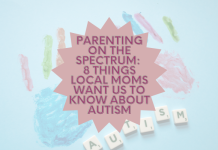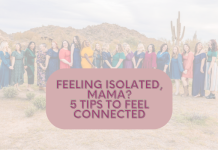Given that we are closing in on the one year mark of living through a global pandemic and cases in Arizona are on the rise, likely you or someone you know has been impacted by Covid-19.
My family was fortunate enough to make it all the way to December without anyone testing positive, but all of that changed over Christmas. Not only did two of my children contract the virus, they also unknowingly spread it to my parents, putting my dad in the hospital and leaving my mom to recover alone at home.
Real talk – it was one of the scariest two weeks of my life. I know many people experience only mild symptoms (the case with my kids), but the unknown of what could happen to my at-risk, immunocompromised parents sent me into a state of panic.
Feeling helpless, I turned to channeling my nervous energy into action. Caring for those around me became my focus and I leveraged as many resources as I could to try and bring comfort, recovery and health back to my family. Having some kind of action plan helped me maintain a level of sanity as we approached each day and moved us past the “what do we do?” phase quickly.
- If someone needs hospitalization, assume a long wait in the ER and plan accordingly. The patient will be alone so talk about a communication plan (we had no contact with my dad for close to 24 hours). Bring a phone charger, glasses, prescriptions etc. Wear comfortable clothes and bring layers as the hospital temperatures tend to be on the colder side.
- For those managing symptoms at home, a few things that were helpful to us:
- In home rapid testing – my mom was already experiencing some symptoms when my dad was hospitalized and tested positive. We were able to schedule a nurse to come out and test her in her own home for the same cost as an onsite rapid test.
- Schedule a telehealth appointment to review your symptoms and get them recorded with your PCP.
- Mobile order a care package of vitamins, meds, supplements so they have them on hand for taking regularly or as needed. Things that were suggested to us:
- Vitamin C, D3, Zinc, Magnesium, Omega 3, and NAC
- Melatonin
- Baby Aspirin
- Mucinex DM
- Pedialyte
- Start a group text and include whoever might want a regular update. People have great intentions with checking in, but especially in the thick of things, this might be overwhelming for the individual with Covid (and likely for whomever is caring for them too). Centralizing communication and setting an expectation for updates can alleviate others’ concern and preserve energy for you.
- Non-medical interventions to help with comfort: deep breathing every hour, short walks, spend 20-30 minutes in the sunshine, take Epsom salt baths, Bedtime Tea with local honey to help with sleep
- As far as food goes, stomach issues can be a symptom for some people. As such, we tried to bring over nutrient dense, easy to eat things like bone broth, fresh fruit smoothies and juices, soups etc.
Socially Distanced Care Considerations:
In our case, my husband and I were still negative throughout the course of this. As such, we wanted to be as safe as possible so we could continue to care for our family. We are lucky that my parents live just a few miles away, so if regular visits aren’t a possibility in your case, recruiting others or using delivery services can be a good alternative.
- Routine check ins – I asked my mom to text each morning and night so I got confirmation that she was doing ok. We also physically went over 3x per day to see her, bring supplies, and visit a bit. We did this safely from her porch with masks and gloves.
- If your loved one is hospitalized, get the number for the nurses’ station and establish a cadence for updates. Because my mom was also positive, we determined it would be best for me to be the point of contact should anything happen. Yes, they are extremely busy, but in my experience, a once a day update was within reason, so if I didn’t hear anything by evening, I would just call. Not being there with them is hard – this makes it a little easier.
- When in doubt, just act. We all know how hard it is to accept help. Asking someone to reach out or call if they need something will likely result in them not doing that. Send a meal, drop off a care package, run an errand. They will thank you in the end.
One last, but very important note: take care of yourself, too. It is easy to let the stress and concern build up – check in, take a breath, go for a walk, lean on your support system, try to sleep. Easier said than done, I know, but it will help you get to the other side.
*This is first-hand experience of what worked for Kira and her family. East Valley Moms is not, and does not claim to be a medical professional, nor do we give medical advice. If you have questions regarding COVID-19, please contact your family physician or visit CDC.gov.












I cried through this! So thankful there was a positive outcome. So many worries! I love my family so much! Kira – you are amazing!